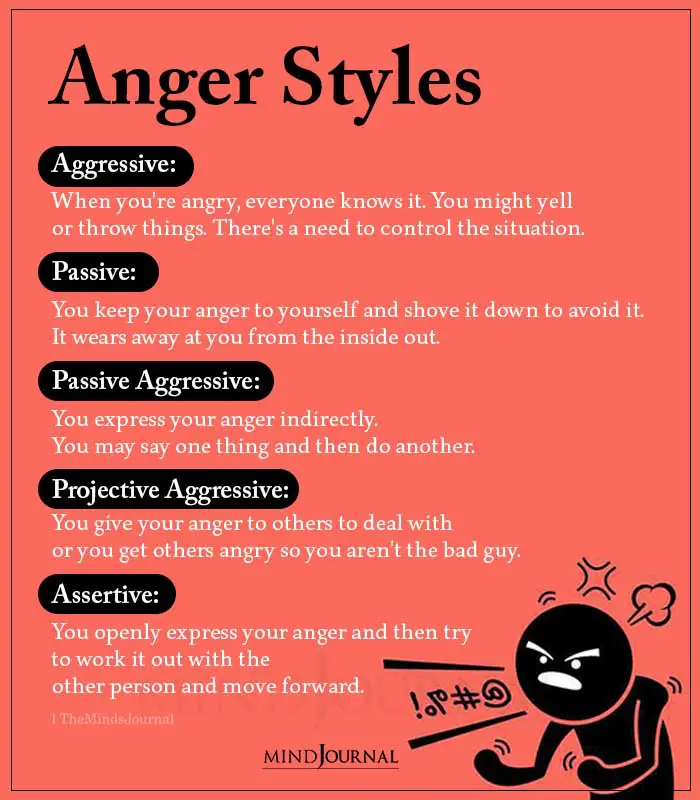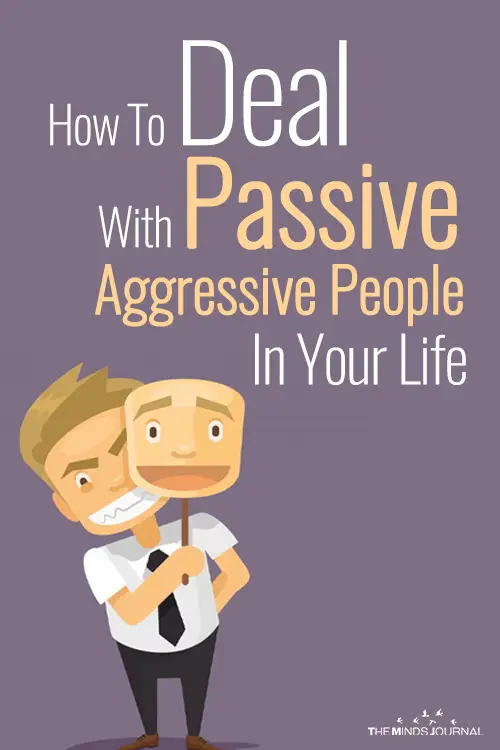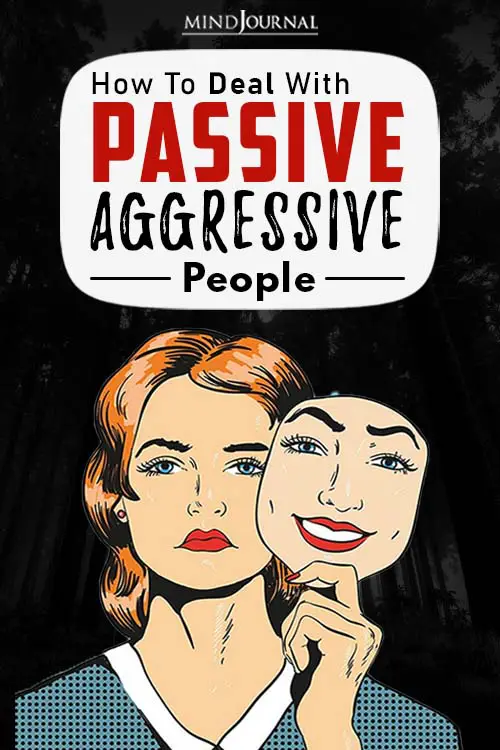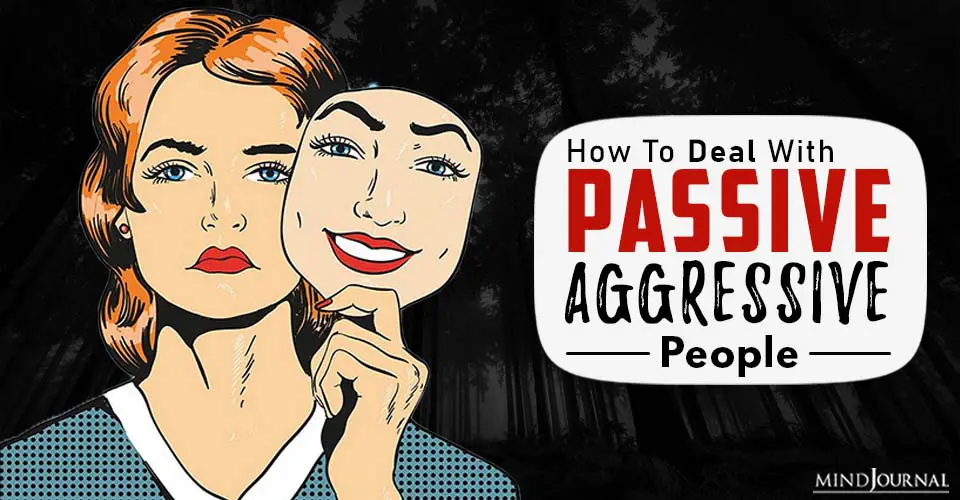Are you dealing with a passive aggressive person? Do they leave you feeling frustrated? As these people never openly or directly express their aggression, you may find yourself playing mind games with them even though you didn’t sign up for it. Here are a few ways for you to deal with passive aggressive people without losing your mind.
“Some people are like clouds … When they’re gone it’s a beautiful day.” – unknown
Passive aggression is a form of anger, except the anger is expressed with a smile instead of the typical expressions. Passive aggressive people are experts at sugar coating hostility. They often use procrastination, bumbling inefficiency, and the exasperating excuse of “I forgot” to avoid commitments or let you down. They appear eager to please but know exactly how to make you mad. They can be infuriating because of their seductive or innocent veneers.

Here are some examples:
- Your spouse brings home yet another gallon of ice cream after you’ve specifically asked him or her not to do this because you are trying to lose weight.
- A friend keeps arriving an hour late for a dinner date leaving you waiting over and over again.
- a co-worker keeps promising to help with a project but never comes through.
Passive aggressive behavior ranges from simply irritating to manipulative and punishing. This is different from occasionally being absent-minded, lazy, or busy. Passive aggression is repetitive and has a covert angry edge to it. Passive aggressive people promise anything, then do exactly as they please. They hide anger beneath a compliant exterior.
They don’t give straight answers and have vague responses such as “I’ll get back to you.” Then they don’t follow through so you must keep reminding them. Sometimes their remarks can be hurtful, especially so because they come at you sideways–you don’t know what hit you.
Read 11 Characteristics of Passive Aggressive Behavior
Why Do People Become Passive Aggressive?
They’re typically raised in families where it’s not safe to express anger–they’re never taught to communicate it in a healthy manner. They adapt by channeling these feelings into other less obvious behaviors; this gives them a sense of power and control. They’re masters at shirking responsibility by hurting you in ways that appear unintentional or unavoidable.
Passive aggressive people operate by stuffing anger, being accommodating, and then indirectly sticking it to you. When confronted, they’ll drive you crazy with a variety of “the dog ate my homework” excuses, blaming others, or yessing you to death without changing. Since many are unaware of their anger, they feel misunderstood or that you’re holding them to unfair standards.
“Some people just need a high-five. In the face. With a chair.” – unknown
Here are tips on how to communicate with passive aggressive people from my book The Power of Surrender. To learn about other types of draining people read my article The Emotional Vampire Survival Guide.
Learning To Communicate With Passive Aggressive People
1. Trust Your Gut Reactions
With these types, you may question yourself since their anger is so masked. It’s important to recognize the pattern. Their mixed messages will test your patience. So when you doubt yourself, take a breath and try to let the doubt go.
Tell yourself, “I deserve to be treated more lovingly. I will trust my gut reaction when I feel jabbed.” This affirmation helps you release doubt so you’d don’t convince yourself you’re imagining things.
Then move forward to improve communication. You must surrender the idea that these people will change without you speaking up. They aren’t motivated to change unless someone calls them on their behavior. When it’s not appropriate to be direct, such as with a boss who might retaliate or fire you, keep letting the zingers go by accepting your powerlessness to change him.
2. Address the behavior
Focus on one issue at a time so people don’t feel attacked or overwhelmed. Let’s say a friend is always late. In a calm, firm tone say to her, “I would greatly appreciate it if you can be on time when we go out to dinner. I feel uncomfortable waiting in a restaurant alone.” Then notice her reaction. She might say, “You’re right. I’m always running behind. I’ll try to be more organized.” Then see if the lateness improves.
If she is evasive or makes excuses, request clarification about how to solve the problem. If you can’t get a straight answer, confront that too. Being specific pins down passive aggressive people. If nothing changes, keep setting limits or stop making dinner plans. With a close friend who continues to be late, it’s always an option to accept and acclimate to his or her shortcomings when the pros of the relationship outweigh the cons.
“Sometimes it’s not the people who change, it’s the mask that falls off.” – Haruki Murakami
As a psychiatrist, I teach my patients to address passive aggressive behavior directly as the person may not be aware of the impact on you since they are short on empathy. Hopefully, you won’t have many passive aggressive people in your life, but if you do, clear communication is a form of empowerment.
Read 12 Characteristics of Passive Aggression and How To Deal With A Passive-Aggressive Partner
Written by Dr. Judith Orloff MD Originally appeared on Dr. Judith Orloff MD
Here’s an interesting video that you may find helpful:
If you’re forced to interact with a passive aggressive person, then you need to realize that it can get very tricky. You need to ignore their words and excuses and pay attention to their actions. You cannot change them or control their behavior. However, you can control yourself and your response.
Despite how frustrating it may get, you need to stay calm and be assertive in your statements. Understand this: it’s never about you. But it’s always about them. So keep your head held high and walk away from their drama.










Leave a Reply
You must be logged in to post a comment.